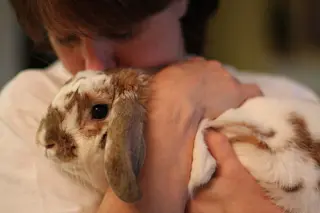Researchers have found changes to rabbit brains that may explain why your pet bunny is so snuggly. Photo Credit: Alex The process of domestication fundamentally changes an animal's looks and behavior. Floppier ears and a loss of fear of humans, for example, are nearly universal in domesticated species. Now, researchers have learned what domestication looks like in the brain—at least, for rabbits. It's not exactly clear when rabbits were converted from one of nature's most skittish animals into the soft, snuggly buddies so often chosen as class pets. But somehow, selective breeding led to bunnies that have lost most of the anxiety their relatives rely on to survive. And it only makes sense that such a shift would show up in their brains. The research team based largely in Sweden, Spain and Portugal had looked at the genomes of wild and domesticated rabbits before, and found distinct differences in genes ...
Becoming Fearless: Study Finds Major Changes to Domesticated Bunny Brains
Discover how domesticated rabbits experience brain changes that affect their behavior and fear processing. Uncover these intriguing findings!
More on Discover
Stay Curious
SubscribeTo The Magazine
Save up to 40% off the cover price when you subscribe to Discover magazine.
Subscribe













